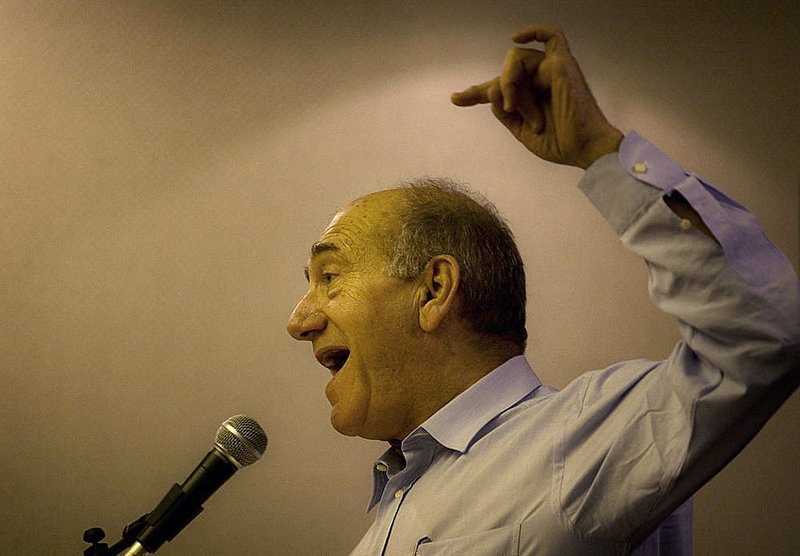JERUSALEM — Former Israeli Prime Minister Ehud Olmert took a rare public jab at his successor Thursday, saying that Israel should agree to the U.S. demand to halt settlement construction in the West Bank to restart Mideast peace talks.
Olmert suggested that the current prime minister, Benjamin Netanyahu, and the Obama administration are wasting valuable time by focusing on such a “marginal” issue, rather than tackling the essential issues at the heart of the Israeli-Palestinian conflict.
President Barack Obama has asked for a new threemonth moratorium on settlement construction after a 10-month slowdown expired in September and caused peace negotiations to stall. Palestinians say they will not talk unless a freeze is in place.
“If someone says that he agrees to 10 months of freezing and the president of the mightiest nation on earth and friendliest nation to Israel comes to you and says, ‘Please give me two [more] months, only two months,’ I mean, what could happen in two months?” Olmert said. “I would say, ‘Mr. President, why two? Why not three? Take three!’”
Netanyahu has yet to commit to a renewal, saying he is waiting for written U.S. assurances.
AP interactive
http://hosted.ap.or…" onclick="window.open(this.href,'popup','height=615,width=765,scrollbars,resizable'); return false;">View a graphic of the Israeli offensive conflict
Olmert, who resigned two years ago to face corruption charges, has largely kept a low profile since leaving office in early 2009 and has refrained from publicly criticizing Netanyahu.
Speaking to foreign correspondents, he said he wouldn’t have agreed to a settlement freeze in the first place, saying it was more important to focus on larger issues such as final borders, the fate of Palestinian refugees and the status of Jerusalem. But he said he would not turn down a request from Israel’s closest ally.
Obama has said he hopes to reach a deal within a year, and Olmert said both Israel and the U.S. should focus on achieving that.
“The substance is what counts and that was not discussed at all and we have wasted a year and a half,” Olmert said. “What counts? A building here or a building there, or a comprehensive peace plan that can resolve the conflict rather than just complicate the arguments about marginal issues?”
Since leaving office, Olmert has confirmed he made Israel’s most far-reaching offer to the Palestinians, proposing a Palestinian state on close to 94 percent of the West Bank and offering them the equivalent of the final 6 percent of territory in a land “swap.”
Olmert said Thursday that the Palestinians never responded to his offer, made in the final months of his term in office.
“I think that they made a mistake. I think that the fact that they didn’t respond to my proposal was a historic mistake of the highest order that they will live to regret for a long time,” he said.
The Olmert plan would have also turned over Arab neighborhoods in east Jerusalem to Palestinian control. Jerusalem’s Old City, with its holy sites, one of the most intractable issues dividing the sides, was to be governed jointly by Israel, the Palestinians, Jordan, Saudi Arabia and the United States.
Olmert’s offer included a link between the West Bank and Gaza through Israeli territory, and he agreed to a symbolic return of some Palestinian refugees to Israel.
Olmert said he met Palestinian President Mahmoud Abbas about three dozen times, developing a strong personal bond and discussing issues down to the finest details. The talks broke down after Israel launched a war against Hamas militants in the Gaza Strip in December 2008 to stop rocket attacks.
Olmert announced his resignation under a cloud of corruption charges in late 2008, and Israeli voters, disillusioned about the chances of peace with the Palestinians, replaced his centrist government with a hard-line coalition led by Netanyahu.
On Thursday, Netanyahu harshly rejected an official Palestinian study claiming that the Western Wall in the Old City of Jerusalem, the holiest site where Jews can pray, is not Jewish at all and belongs to the Muslims.
In a statement, Netanyahu said the new study tries to deny the Jewish link to the Holy Land and “calls into serious question [Palestinian] intentions of reaching a peace agreement, the foundations of which are coexistence and mutual recognition.”
Olmert gave a vote of confidence to Obama - who has clashed with Netanyahu - calling him a “genuine partner.”
“I think that George W. Bush was probably the friendliest president that ever sat in the White House, as far as Israel is concerned, and his concept of an agreement was based on the ’67 borders and on the division of Jerusalem,” Olmert said, pointing out that Obama wants the same.
“Why is one the greatest friend and one is an enemy? I can’t understand it.”
Front Section, Pages 12 on 11/26/2010
